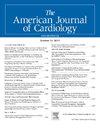Colchicine in Patients With Coronary Disease Who Underwent Coronary Artery Bypass Surgery: A Meta-Analysis of Randomized Controlled Trials
IF 2.3
3区 医学
Q2 CARDIAC & CARDIOVASCULAR SYSTEMS
引用次数: 0
Abstract
Recent randomized evidence has shown that low-dose colchicine lowers the risk of cardiovascular events in patients with chronic coronary artery disease. Colchicine has also been used in coronary artery bypass grafting (CABG), with individual studies suggesting protective effects for postoperative atrial fibrillation (POAF). We performed a meta-analysis of studies assessing the effect of colchicine on outcomes in CABG surgery. We systematically searched 3 libraries (MEDLINE, Web of Science, and the Cochrane Library), selecting all randomized control trials including patients who underwent CABG and were randomized for perioperative administration of colchicine versus standard of care. The primary outcome was incidence of POAF. The inverse variance method (DerSimonian&Laird) and random-effects model were performed. The leave-one-out analysis was carried out as a sensitivity analysis to address possible outliers. From 205 screened studies, 5 met the inclusion criteria and were selected. The data from 839 patients were included in the final analysis. The included studies were published between 2014 and 2022. The perioperative administration of colchicine was associated with the reduction of POAF rates after CABG compared with standard of care (relative risk 0.54, 95% confidence interval 0.40 to 0.73, p <0.01). The leave-one-out analysis confirmed the robustness of the analysis, with minimal variations of the confidence interval. This meta-analysis of randomized studies suggests that the perioperative administration of colchicine is associated with significant reduction of POAF after CABG.
接受冠状动脉搭桥手术的冠心病患者服用秋水仙碱--随机对照试验的 Meta 分析。
背景:最近的随机证据显示,小剂量秋水仙碱可降低慢性冠状动脉疾病(CAD)患者发生心血管事件的风险。秋水仙碱还被用于冠状动脉旁路移植术(CABG),个别研究表明秋水仙碱对术后心房颤动(POAF)有保护作用。我们对评估秋水仙碱对 CABG 手术预后影响的研究进行了荟萃分析:我们系统地检索了三个图书馆(MEDLINE、Web of Science 和 Cochrane 图书馆),选择了所有随机对照试验,其中包括接受 CABG 手术的患者,并对围术期服用秋水仙碱与标准护理进行了随机对照。主要结果是 POAF 的发生率。采用了逆方差法(DerSimonian&Laird)和随机效应模型。作为敏感性分析,进行了剔除分析,以解决可能出现的异常值:从筛选出的 205 项研究中,有 5 项符合纳入标准并被选中。最终分析纳入了 839 名患者的数据。纳入的研究发表于 2014 年至 2022 年之间。与标准护理相比,CABG术后围手术期应用秋水仙碱与POAF发生率的降低有关(相对风险;RR= 0.54,95%置信区间,CI,0.40-0.73,p):这项随机研究的荟萃分析表明,围手术期服用秋水仙碱可显著降低 CABG 术后的 POAF。
本文章由计算机程序翻译,如有差异,请以英文原文为准。
求助全文
约1分钟内获得全文
求助全文
来源期刊

American Journal of Cardiology
医学-心血管系统
CiteScore
4.00
自引率
3.60%
发文量
698
审稿时长
33 days
期刊介绍:
Published 24 times a year, The American Journal of Cardiology® is an independent journal designed for cardiovascular disease specialists and internists with a subspecialty in cardiology throughout the world. AJC is an independent, scientific, peer-reviewed journal of original articles that focus on the practical, clinical approach to the diagnosis and treatment of cardiovascular disease. AJC has one of the fastest acceptance to publication times in Cardiology. Features report on systemic hypertension, methodology, drugs, pacing, arrhythmia, preventive cardiology, congestive heart failure, valvular heart disease, congenital heart disease, and cardiomyopathy. Also included are editorials, readers'' comments, and symposia.
 求助内容:
求助内容: 应助结果提醒方式:
应助结果提醒方式:


